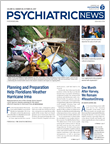Innovation and professional well-being are two of the central priorities of my year as your president. As I see it, part of my responsibility is to use the experience, perspective, and opportunity afforded by being APA’s president to think about the health and future opportunities of psychiatrists as well as the profession of psychiatry as practiced in this country. Key components of our capacity to thrive in the future are professional well-being and innovation. Why do I say this?
Practice what you practice. This is a phrase developed by Dr. Terrance McGill, who worked with me and APA’s Work Group on Psychiatrist Well-Being and Burnout chaired by Dr. Rick Summers early in its development. Developing the foundation for several of my presidential projects was an elective experience in the final year of Terrance’s preventive medicine residency training at Johns Hopkins. One of the great advantages in working at a place like Hopkins is the opportunity to work on projects with creative and intelligent people. Terrance is a nontraditional resident with experience in telecommunications. The notion of bringing something that is used or developed in one setting into an alternative setting can be called analogous learning. Analogous learning is one technique in the tool box of innovation teams.
Regarding well-being, the notion of “practice what you practice” is not new to us; many of us have told our patients, “You can’t be there for others (family members, children, unwell parents, friends, bosses, co-workers, to name just a few of the people in your life) if you are not well yourself.” We often tell patients, “You can’t be there for others if you are not well yourself.” We support patients with the notion that treating the depression, psychosis, anxiety—whatever the disorder may be—so that they can resume family and other life roles. Many times, a caring professional helps by giving permission to patients to prioritize self-care as a precondition to functioning and recovery. All of us in clinical practice are likely to have experience with this fundamental principle, no matter what patient population we serve.
The notion of practice what you practice has to do with encouraging us as practicing psychiatrists to look at our own lives, our own vulnerabilities, and our own behaviors—to give ourselves permission to be vulnerable beings who need to take care of ourselves so that we can function well for ourselves and for others. Many of us need to consciously move from the contemplation or even precontemplation phase of change into the action phase.
A first action we can take is to collect more information about our circumstances. We know that common causes of unwellness or burnout are often associated with two groups of factors: personal and work-environment factors. In this context, personal factors include individual perspectives, experiences, and risk factors. These may or may not be obvious, and probably more often for psychiatrists than for other physicians, we are taught through attention to countertransference to identify and manage some of these risk factors. Our attention in training to formal and informal countertransference issues may be part of the reason that psychiatrists report lower overall rates of burnout than many other types of physicians. We are taught that what is happening in our treatment settings has an impact on our personal selves and that awareness and active management of it is an important basic psychotherapy skill.
In thinking about work-environment factors that could contribute to burnout, we receive little or no training about the management of workflow optimization, electronic medical record (EMR) screens and workflows, staffing and HR issues, caseload management, productivity expectations, and other practice-related issues. In fact, we may be disadvantaged compared with our peers in faster-paced and higher-volume settings like primary care, emergency medicine, and surgical specialty care. For many of us, the initial attraction to psychiatry might have included self-awareness that chaotic busy practice environments would not match well with our personal strengths.
Several major hospital systems have begun initiatives to look at work environments and what can be done to restore the “joy in practicing medicine.” It turns out that a major work-environment contributor to stress that was not present even as much as 10 years ago is, in fact, EMRs. A survey of 1,016 physicians in Wisconsin revealed that while many thought that electronic access to and exchange of medical information could lead to improvements in patient care, the burden of data entry was a major contributor to practice burnout, extended work at home, and increased professional dissatisfaction. “Electronic health records serve as both a satisfier and dissatisfier and as a potential driver for future physician satisfaction interventions,” the authors reported in the August 2015 Wisconsin Medical Journal. Many other studies have demonstrated that EMRs alone are a major contributor to the current causes of physician burnout in this country.
The discipline of innovation about which I wrote in an earlier column (
Psychiatric News,
September 1) offers some genuine possibilities. Many aspects of the discipline of innovation about which I wrote can be applied to improving our well-being. I think of innovation as a pathway forward for psychiatry in America. Specifically, to use EMRs as an example, innovation techniques can help us move from the role of data entry clerk into power user. Let’s use some analogous thinking (as I also pointed out in my earlier column, analogous thinking is an innovation tool) to analyze the problem further. What other example can we think of where data entry was a problem, and what solution was used? By identifying the specific problem as a data entry problem, we have used another facet of innovation, which is clarity in defining the “problem to be solved.” The data entry problem can be addressed in various ways. According to Dr. Luming Li, who is an APA/APAF Public Psychiatry Fellow and president of the Executive Board of the Yale New Haven Hospital Resident/Fellow Senate, her institution has started a medical transcription service to help mitigate the data entry problem.
Innovation is an important element in the path forward for psychiatry. Thinking about, reading about, digesting, and becoming familiar with some of the foundations and practices of innovation can be useful for solving problems like professional burnout. Unless we as a profession align ourselves with innovation as an important part of our future, we risk becoming less relevant and at increased risk for helplessness in the management of burnout and the future of our profession. We need to practice what we practice, look at ourselves as essential healers, and harness the promises of innovation so that we advance as valuable providers of accessible, safe, and effective medicine for the patients we serve. ■

